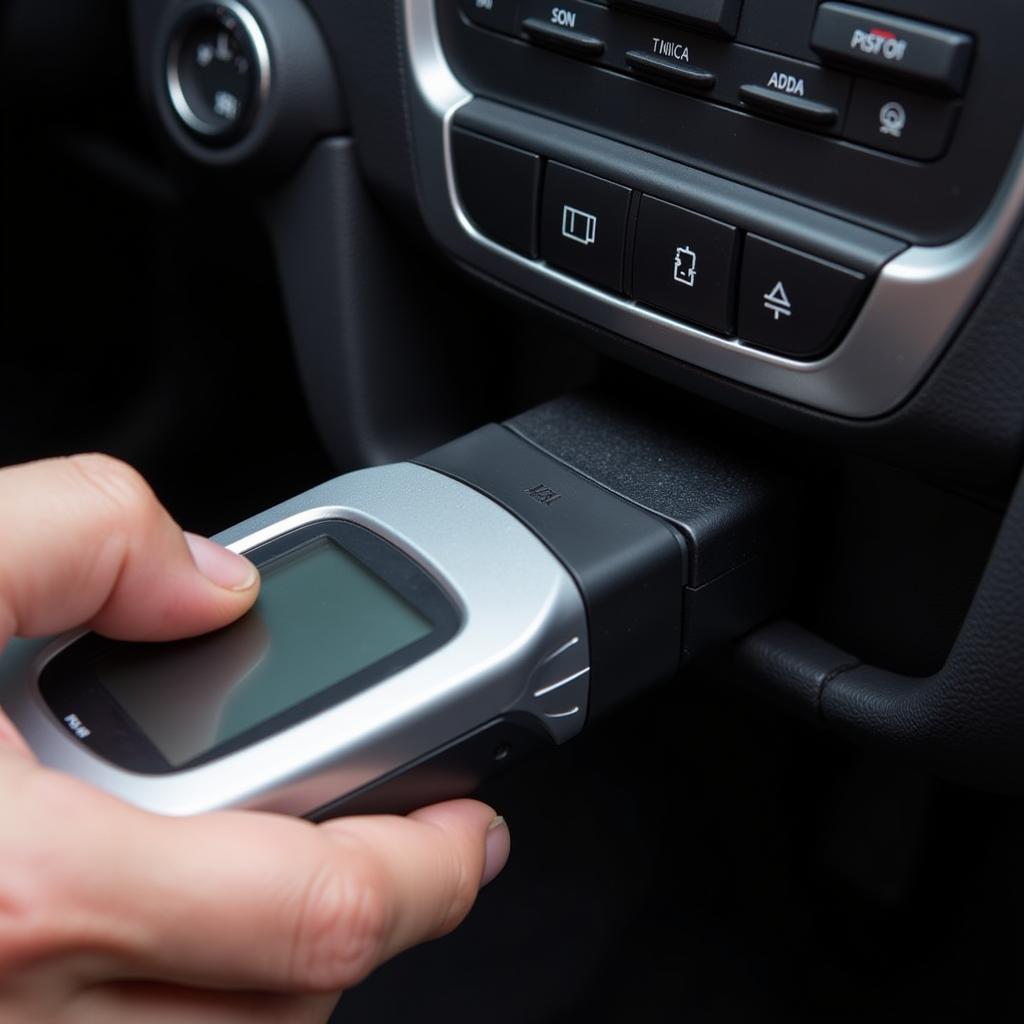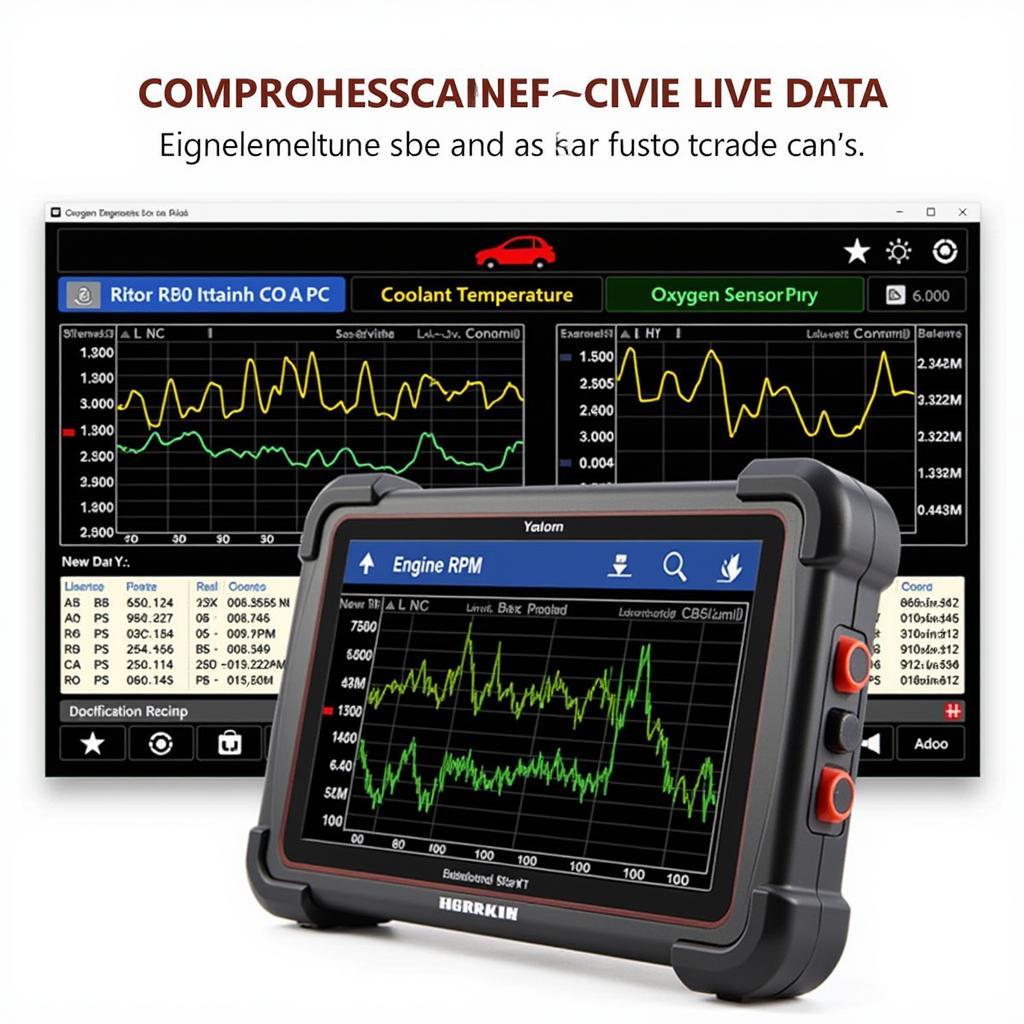Shopping for a car diagnostic scanner can feel like navigating a maze, especially with countless options flooding the market. Whether you’re a seasoned mechanic or a car enthusiast looking to demystify those pesky check engine lights, understanding your needs is key to finding the perfect OBD2 car diagnostic scanner. This comprehensive review dives deep into the world of car diagnostic scanners, providing the knowledge and insights to make an informed decision.
What is an OBD2 Car Diagnostic Scanner?
Before we delve into the intricacies of car diagnostic scanners, let’s clarify what they are and why they’re essential. An OBD2 (On-Board Diagnostics, second generation) car diagnostic scanner is essentially a tool that acts as a window into your car’s computer system. It allows you to communicate with your car’s ECU (Electronic Control Unit), retrieving valuable diagnostic information.
 OBD2 Scanner Connected to a Car
OBD2 Scanner Connected to a Car
Think of it as a translator between you and your car, deciphering those cryptic engine codes into understandable language.
Why You Need a Car Diagnostic Scanner
You might be wondering if a car diagnostic scanner is truly necessary. The answer, in many cases, is a resounding yes! Here’s why:
- Early Problem Detection: A car diagnostic scanner can detect issues before they escalate, saving you from potentially costly repairs down the line.
- DIY Repairs: For the mechanically inclined, a scanner empowers you to diagnose and potentially fix minor issues yourself, avoiding expensive trips to the mechanic.
- Peace of Mind: That nagging check engine light can be a source of anxiety. A scanner provides clarity, letting you know the severity of the issue and whether immediate attention is required.
- Used Car Inspections: Planning to buy a used car? A scanner can reveal hidden problems that might not be apparent during a visual inspection.
Types of Car Diagnostic Scanners
The world of car diagnostic scanners is vast, offering options for every budget and skill level. Here’s a breakdown of the common types:
1. Basic Code Readers
As the name suggests, basic code readers are entry-level scanners designed to read and clear basic engine codes. They are an affordable option for casual users who want to understand the reason behind a check engine light.
2. Advanced OBD2 Scanners
 Advanced OBD2 Scanner Features Display
Advanced OBD2 Scanner Features Display
A step up from basic code readers, advanced OBD2 scanners offer a wider range of features, including:
- Live Data Streaming: Monitor real-time engine parameters like RPM, speed, and temperature.
- Freeze Frame Data: Access a snapshot of the engine’s condition when a fault code was stored.
- Enhanced Diagnostics: Perform specific tests on components like ABS, airbags, and transmission (depending on the scanner and vehicle compatibility).
3. Professional-Grade Scan Tools
Professional-grade scan tools are the gold standard for mechanics and experienced technicians. These sophisticated devices provide comprehensive diagnostic capabilities, including:
- Bi-Directional Control: Interact with and control vehicle systems to test functionality.
- Programming and Coding: Perform tasks like key fob programming and module coding.
- Advanced Diagnostic Functions: Access manufacturer-specific diagnostic procedures.
Choosing the Right Car Diagnostic Scanner
Navigating the world of car diagnostic scanners can be overwhelming. To simplify the process, consider these factors when choosing the right one for you:
1. Your Budget
Car diagnostic scanners range in price from affordable to expensive. Determine a budget beforehand to narrow down your options.
2. Your Skill Level
Are you comfortable with basic diagnostics, or do you need advanced functionalities? Choose a scanner that aligns with your technical expertise.
3. Vehicle Compatibility
Not all scanners are compatible with all car makes and models. Ensure the scanner you choose supports your vehicle’s OBD2 protocols.
4. User Interface
Opt for a scanner with a user-friendly interface, clear menus, and easy-to-understand instructions.
Top Car Diagnostic Scanner Features to Look For
When evaluating different car diagnostic scanners, certain features can significantly enhance your experience:
- Read and Clear Codes: This is a fundamental feature, allowing you to identify and clear fault codes.
- Live Data Stream: Real-time data on engine parameters offers valuable insights into your vehicle’s performance.
- Data Logging and Playback: Record data logs for later analysis or to share with a mechanic.
- Multilingual Support: Choose a scanner that supports multiple languages for convenience.
- Software Updates: Regular software updates ensure compatibility with newer vehicle models and provide access to the latest features.
Car Diagnostic Scanner Reviews: Our Top Picks
To guide you further, let’s explore some highly-rated car diagnostic scanners:
- Foxwell NT301 Car Diagnostic Scan Tool Reviews: A popular choice for its user-friendly interface and comprehensive diagnostic capabilities.
- Carly Diagnostic Tool Review: A mobile-based solution that pairs with your smartphone for convenient diagnostics.
- Konnwei Car Diagnostic Code Reader Reviews: A budget-friendly option that excels at reading and clearing basic engine codes.
Tips for Using a Car Diagnostic Scanner
- Consult Your Vehicle’s Manual: Familiarize yourself with the location of the OBD2 port and any specific instructions.
- Understand the Codes: Use reliable resources to decipher the meaning of fault codes.
- Clear Codes Carefully: Only clear codes after addressing the underlying issue.
- Seek Professional Help When Needed: Don’t hesitate to consult a qualified mechanic for complex problems.
Conclusion: Take Control of Your Car’s Health
Investing in a car diagnostic scanner is an investment in your vehicle’s well-being. It empowers you with knowledge, potentially saving you time, money, and unnecessary stress. By carefully considering your needs and researching available options, you can find the perfect OBD2 car diagnostic scanner to keep your car running smoothly for years to come.
Frequently Asked Questions (FAQs)
1. Can I use any OBD2 scanner on any car?
While most cars manufactured after 1996 are OBD2 compliant, compatibility can vary. It’s crucial to check the scanner’s specifications and ensure it supports your vehicle’s make and model.
2. What does a check engine light indicate?
A check engine light can signal a range of issues, from minor problems like a loose gas cap to more serious engine malfunctions. A car diagnostic scanner can pinpoint the exact cause.
3. Can I fix a problem myself using a car diagnostic scanner?
While a scanner can identify the problem, attempting DIY repairs depends on your mechanical skills and the complexity of the issue. For major repairs, it’s always advisable to consult a professional.
4. How often should I use a car diagnostic scanner?
It’s a good practice to scan your car periodically, especially if you notice unusual performance or the check engine light illuminates.
5. Are car diagnostic scanners difficult to use?
Most modern scanners are designed with user-friendliness in mind. However, the complexity of features can vary. Choose a scanner that aligns with your technical comfort level.
Need assistance with choosing the right car diagnostic scanner? Our team of experts is here to help! Contact us via WhatsApp: +1(641)206-8880, Email: [email protected]. We offer 24/7 customer support to answer your questions and guide you towards the best solution for your needs. You can also explore our comprehensive reviews on various car diagnostic scanners, including car diagnostic scanner tool u480 reviews and universal car diagnostic tool reviews, to make an informed decision.

Leave a Reply